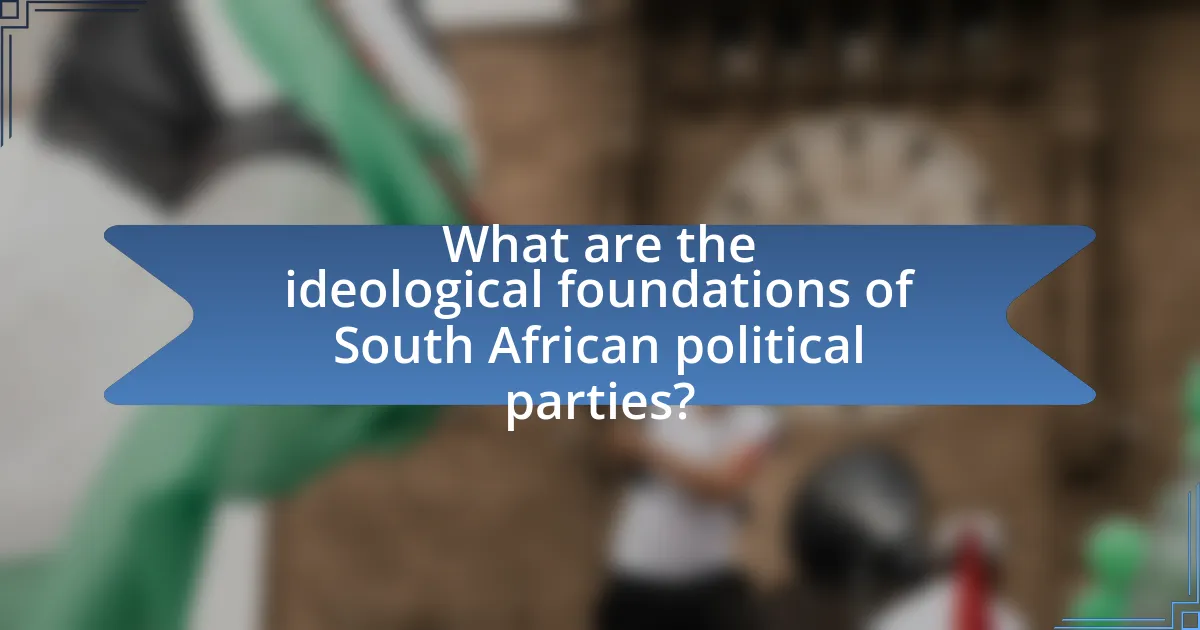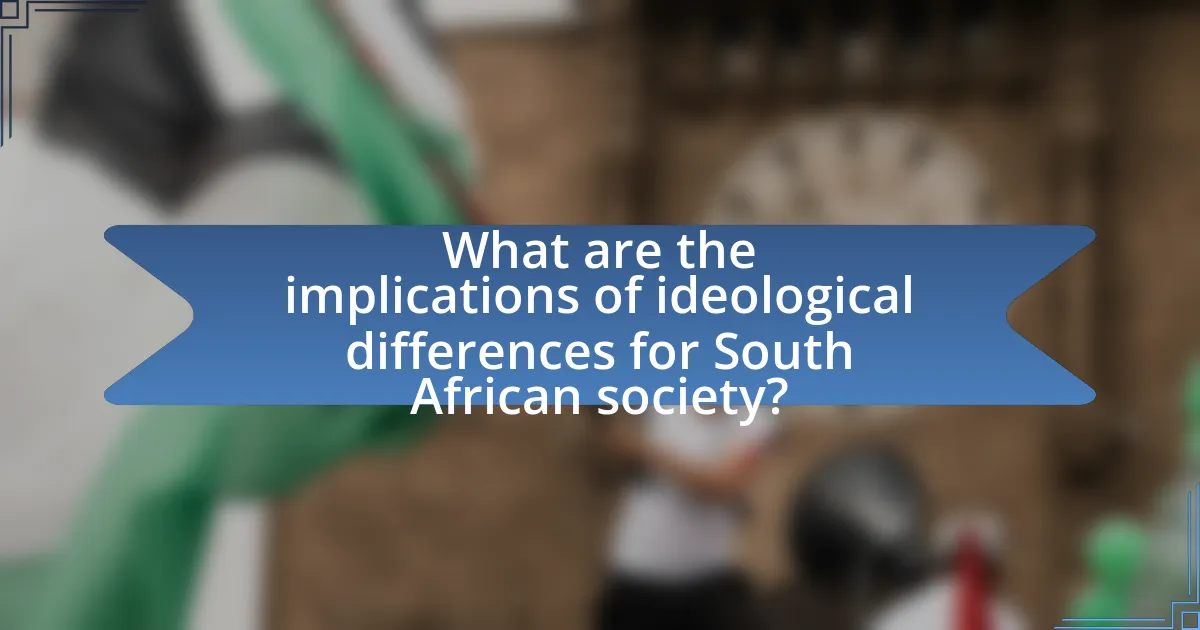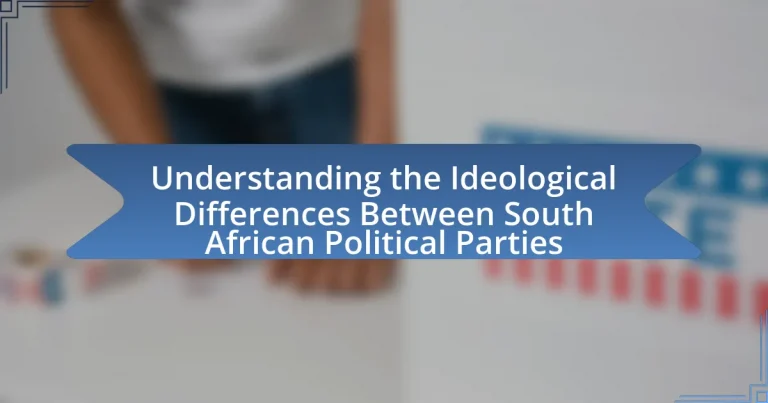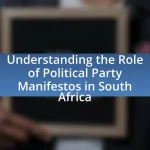The article examines the ideological foundations of South African political parties, highlighting key categories such as nationalism, socialism, liberalism, and conservatism. It discusses how historical contexts, particularly the legacy of apartheid, have shaped these ideologies and influenced party platforms, including the African National Congress (ANC), Democratic Alliance (DA), and Economic Freedom Fighters (EFF). The article further explores the implications of these ideological differences on policy-making, social justice initiatives, and voter behavior, emphasizing the challenges and strategies parties face in bridging ideological divides.

What are the ideological foundations of South African political parties?
The ideological foundations of South African political parties are primarily rooted in nationalism, socialism, liberalism, and conservatism. The African National Congress (ANC) embodies a mix of nationalism and socialism, advocating for social justice and economic equality, which is evident in its policies aimed at redressing historical injustices. The Democratic Alliance (DA) is grounded in liberalism, promoting individual rights, free market principles, and non-racialism, as reflected in its governance in various municipalities. The Economic Freedom Fighters (EFF) adopt a radical socialist stance, focusing on land expropriation without compensation and wealth redistribution, which aligns with their Marxist-Leninist ideology. Additionally, smaller parties like the Freedom Front Plus (FF+) emphasize Afrikaner nationalism and conservative values, advocating for the rights of Afrikaners and minority groups. These ideological distinctions shape the political landscape and influence policy-making in South Africa.
How do historical contexts shape these ideologies?
Historical contexts significantly shape ideologies by influencing the values, beliefs, and priorities of political parties. In South Africa, the legacy of apartheid has profoundly impacted the ideological frameworks of various political parties, such as the African National Congress (ANC) and the Democratic Alliance (DA). The ANC’s ideology is rooted in anti-colonialism and social justice, reflecting the historical struggle against racial oppression, while the DA emphasizes liberal democracy and economic growth, shaped by its origins in the opposition to apartheid and its focus on governance. This divergence illustrates how historical events, such as the transition to democracy in 1994, have created distinct ideological paths for these parties, affecting their policies and voter bases.
What role did apartheid play in forming political ideologies?
Apartheid significantly shaped political ideologies in South Africa by institutionalizing racial segregation and discrimination, which led to the emergence of various political movements. The oppressive policies of apartheid, enacted from 1948 to the early 1990s, galvanized resistance among marginalized groups, particularly the African National Congress (ANC), which adopted a liberation ideology focused on equality and justice. In contrast, the National Party, which implemented apartheid, promoted a white supremacist ideology that justified segregation and economic disparity. This ideological divide fostered the development of alternative political frameworks, such as Black Consciousness and Pan-Africanism, which sought to empower black South Africans and challenge colonial legacies. The struggle against apartheid also inspired global anti-colonial movements, further influencing political ideologies beyond South Africa.
How have post-apartheid developments influenced party ideologies?
Post-apartheid developments have significantly influenced party ideologies in South Africa by shifting the focus from racial liberation to socio-economic issues. The African National Congress (ANC), initially centered on anti-apartheid struggle, has increasingly adopted neoliberal economic policies, emphasizing market-driven growth and attracting foreign investment, which has led to criticism from leftist factions within the party and other political entities like the Economic Freedom Fighters (EFF). The EFF, emerging in 2013, advocates for radical economic transformation, land expropriation without compensation, and wealth redistribution, reflecting a response to perceived failures of the ANC’s policies. Additionally, the rise of smaller parties, such as the Democratic Alliance (DA), has introduced a liberal, pro-business ideology that prioritizes governance and service delivery, further diversifying the political landscape. These ideological shifts are evident in electoral outcomes, policy debates, and the increasing fragmentation of the political spectrum, illustrating how post-apartheid realities have reshaped party platforms and voter alignments.
What are the key ideological categories among South African political parties?
The key ideological categories among South African political parties include nationalism, socialism, liberalism, and conservatism. Nationalism is primarily represented by the African National Congress (ANC), which emphasizes the importance of African identity and self-determination. Socialism is reflected in parties like the Economic Freedom Fighters (EFF), advocating for radical economic transformation and wealth redistribution. Liberalism is represented by the Democratic Alliance (DA), focusing on individual rights, free market policies, and democratic governance. Conservatism is less prominent but can be seen in smaller parties that prioritize traditional values and economic stability. These ideological distinctions shape the political landscape and influence policy-making in South Africa.
What distinguishes leftist ideologies from rightist ideologies in South Africa?
Leftist ideologies in South Africa prioritize social equality, wealth redistribution, and state intervention in the economy, while rightist ideologies emphasize individualism, free market principles, and limited government intervention. For instance, the African National Congress (ANC) embodies leftist principles through its focus on land reform and social welfare programs, whereas the Democratic Alliance (DA) represents rightist views by advocating for economic liberalization and private enterprise. This distinction is evident in policy debates, where leftist parties often push for policies aimed at reducing inequality, while rightist parties argue for economic growth through market-driven solutions.
How do centrist parties position themselves ideologically?
Centrist parties position themselves ideologically by advocating for a balanced approach that incorporates elements from both the left and right of the political spectrum. They typically emphasize pragmatism over ideology, seeking to address issues through moderate policies that appeal to a broad range of voters. For instance, in South Africa, centrist parties like the Democratic Alliance promote policies that support economic growth while also addressing social inequalities, reflecting a blend of liberal economic principles and social democratic values. This positioning allows them to attract diverse voter bases, aiming to unify rather than polarize the electorate.

How do the major political parties in South Africa differ ideologically?
The major political parties in South Africa differ ideologically primarily in their approaches to governance, economic policy, and social issues. The African National Congress (ANC) advocates for a mixed economy with a focus on social justice and redistribution, emphasizing the need for state intervention in the economy to address historical inequalities. In contrast, the Democratic Alliance (DA) promotes a liberal economic agenda that prioritizes free market principles, individual rights, and limited government intervention, aiming for economic growth through private sector development. The Economic Freedom Fighters (EFF) adopt a radical leftist stance, calling for the nationalization of key industries and land expropriation without compensation, reflecting a more militant approach to addressing economic disparities. These ideological differences are rooted in each party’s historical context and foundational principles, shaping their policies and electoral strategies.
What are the core beliefs of the African National Congress (ANC)?
The core beliefs of the African National Congress (ANC) include the promotion of non-racialism, social justice, and economic equality. The ANC advocates for a united South Africa where all citizens, regardless of race, have equal rights and opportunities. This commitment is rooted in the party’s historical struggle against apartheid, which aimed to dismantle systemic racial discrimination. Additionally, the ANC emphasizes the importance of economic transformation to address historical injustices and improve the living conditions of marginalized communities, as reflected in policies aimed at land reform and wealth redistribution.
How does the ANC’s ideology reflect its historical roots?
The African National Congress (ANC) ideology reflects its historical roots through its commitment to anti-colonialism, social justice, and the struggle against apartheid. Founded in 1912, the ANC emerged as a response to systemic racial oppression and discrimination in South Africa, advocating for the rights of black South Africans. The organization’s ideology is deeply influenced by the experiences of its leaders, such as Nelson Mandela and Oliver Tambo, who fought against colonial rule and apartheid, emphasizing equality and human rights. The ANC’s adoption of the Freedom Charter in 1955, which called for a non-racial, democratic South Africa, further illustrates its historical commitment to inclusivity and social equity. This foundational document reflects the ANC’s roots in the broader liberation movement, aiming to dismantle the socio-economic structures established during colonialism and apartheid.
What are the criticisms of the ANC’s current ideological stance?
The African National Congress (ANC) faces criticisms regarding its current ideological stance, particularly for perceived deviations from its original principles of equality and social justice. Critics argue that the ANC has shifted towards a more neoliberal economic approach, prioritizing market-driven policies over the needs of the marginalized. This shift has led to increased inequality and unemployment, with the unemployment rate in South Africa reaching approximately 34% in 2023, highlighting the failure to address economic disparities. Additionally, the ANC’s reliance on patronage and corruption allegations has undermined its credibility, leading to disillusionment among its traditional support base. These criticisms reflect a growing sentiment that the ANC is straying from its foundational goals of liberation and empowerment for all South Africans.
What ideological positions does the Democratic Alliance (DA) advocate?
The Democratic Alliance (DA) advocates for liberal democratic principles, emphasizing individual rights, economic freedom, and social justice. The party promotes a market-oriented economy, prioritizing policies that encourage entrepreneurship and job creation, while also advocating for the protection of civil liberties and human rights. The DA’s commitment to anti-corruption measures and good governance is evident in its policies aimed at increasing transparency and accountability within government institutions. Additionally, the DA supports inclusive policies that aim to address historical inequalities and promote equal opportunities for all South Africans.
How does the DA’s ideology compare to that of the ANC?
The Democratic Alliance (DA) promotes a liberal, market-oriented ideology focused on individual rights, economic growth, and non-racialism, while the African National Congress (ANC) adheres to a more socialist, state-driven approach emphasizing collective rights, social justice, and historical redress. The DA advocates for policies that encourage private enterprise and competition, as evidenced by its support for economic reforms aimed at attracting investment. In contrast, the ANC’s policies often prioritize state intervention in the economy and redistribution of wealth, reflecting its commitment to addressing the inequalities stemming from apartheid. This ideological divergence is evident in their respective approaches to issues such as land reform and economic management, with the DA favoring market solutions and the ANC supporting state-led initiatives.
What challenges does the DA face in promoting its ideology?
The Democratic Alliance (DA) faces significant challenges in promoting its ideology, primarily due to its struggle to appeal to a diverse electorate in South Africa. The DA’s liberal policies often resonate more with urban, middle-class voters, which limits its reach among poorer, rural communities who may prioritize different issues such as land reform and economic inequality. Additionally, the DA contends with a historical perception as a party primarily representing white interests, which hampers its ability to attract a broader demographic. This perception is reinforced by the party’s electoral performance, where it has consistently struggled to gain substantial support from black voters, who constitute a majority in the country. Furthermore, the DA faces competition from other political parties, such as the African National Congress (ANC) and the Economic Freedom Fighters (EFF), which have established strong emotional and historical connections with the electorate, making it difficult for the DA to position itself as a viable alternative.
What is the ideological stance of the Economic Freedom Fighters (EFF)?
The ideological stance of the Economic Freedom Fighters (EFF) is rooted in radical leftist principles, advocating for economic emancipation and social justice. The EFF promotes policies such as land expropriation without compensation, nationalization of key industries, and the redistribution of wealth to address historical inequalities in South Africa. Founded in 2013 by Julius Malema, the party positions itself as a champion of the marginalized and aims to dismantle the existing economic structures that perpetuate poverty and inequality. The EFF’s platform is influenced by Marxist-Leninist thought, emphasizing the need for a revolutionary approach to achieve its goals.
How does the EFF’s ideology appeal to younger voters?
The Economic Freedom Fighters’ (EFF) ideology appeals to younger voters through its focus on radical economic transformation and social justice. This appeal is evident in the party’s commitment to land redistribution, nationalization of key industries, and addressing economic inequalities, which resonate with the aspirations of younger generations facing high unemployment and economic instability. Additionally, the EFF’s emphasis on youth empowerment and activism aligns with the values of younger voters who seek to challenge the status quo and advocate for their rights. The party’s vibrant and confrontational political style, along with its use of social media to engage and mobilize young people, further enhances its attractiveness to this demographic.
What are the implications of the EFF’s radical approach to economic issues?
The Economic Freedom Fighters’ (EFF) radical approach to economic issues implies significant shifts in South Africa’s economic landscape, particularly through policies advocating for land expropriation without compensation and nationalization of key industries. This approach aims to address historical inequalities and redistribute wealth, potentially leading to increased economic instability and investor uncertainty. For instance, the EFF’s land reform proposals have sparked debates about property rights and agricultural productivity, as evidenced by the mixed outcomes of similar policies in other countries. Additionally, the EFF’s stance may polarize political discourse, influencing other parties to adopt more extreme positions to counteract its influence.

What are the implications of ideological differences for South African society?
Ideological differences significantly impact South African society by influencing political discourse, social cohesion, and policy-making. These differences manifest in the contrasting views of major political parties, such as the African National Congress (ANC), which emphasizes social justice and redistribution, and the Democratic Alliance (DA), which prioritizes economic liberalism and individual rights. Such ideological divides can lead to polarization among the populace, affecting community relations and fostering tensions. For instance, the historical context of apartheid and its legacy continues to shape ideological perspectives, resulting in ongoing debates about land reform and economic inequality. These debates often reflect deeper societal divisions, complicating efforts to achieve national unity and collective progress.
How do these ideological differences affect policy-making?
Ideological differences significantly affect policy-making by shaping the priorities and approaches of political parties in South Africa. For instance, the African National Congress (ANC) emphasizes social justice and economic redistribution, which influences its policies on land reform and welfare programs. Conversely, the Democratic Alliance (DA) prioritizes free-market principles and individual rights, leading to policies that focus on economic growth and reducing state intervention. These contrasting ideologies result in divergent legislative agendas, impacting the effectiveness and direction of governance. Historical context shows that during the 2019 elections, the ANC’s focus on transformation policies clashed with the DA’s emphasis on economic liberalization, illustrating how these ideological divides can lead to gridlock in policy implementation and affect the overall political landscape.
What are the impacts on social justice and equality initiatives?
Social justice and equality initiatives significantly impact societal structures by promoting equitable access to resources and opportunities. These initiatives aim to address systemic inequalities related to race, gender, and economic status, fostering a more inclusive society. For instance, the implementation of affirmative action policies in South Africa has aimed to rectify historical injustices faced by marginalized communities, resulting in increased representation in education and employment sectors. According to the South African Human Sciences Research Council, affirmative action has led to a notable rise in the number of black professionals in various fields, illustrating the tangible benefits of such initiatives in advancing social equity.
How do ideological divides influence economic policies?
Ideological divides significantly influence economic policies by shaping the priorities and approaches of political parties. For instance, in South Africa, the African National Congress (ANC) typically advocates for state intervention and social welfare programs, reflecting a more leftist ideology, while the Democratic Alliance (DA) promotes free-market principles and fiscal conservatism, aligning with a more right-leaning perspective. This divergence leads to contrasting policies on issues such as taxation, public spending, and regulation. Historical context shows that during the ANC’s tenure, policies like the Expanded Public Works Programme aimed to reduce unemployment through government initiatives, whereas the DA’s policies focus on attracting private investment to stimulate economic growth. Such ideological divides create distinct economic landscapes, influencing both domestic and foreign investment decisions.
What role do ideological differences play in voter behavior?
Ideological differences significantly influence voter behavior by shaping individuals’ political preferences and party affiliations. Voters often align with parties that reflect their beliefs on key issues such as economic policy, social justice, and governance. For instance, in South Africa, the African National Congress (ANC) promotes a social democratic ideology, appealing to voters who prioritize equality and social welfare, while the Democratic Alliance (DA) advocates for liberal economic policies, attracting those who favor market-driven solutions. Research indicates that ideological alignment can predict voting patterns; a study by the Institute for Justice and Reconciliation found that 70% of South African voters identified their party preference based on ideological beliefs. This demonstrates that ideological differences are crucial in determining how voters engage with political parties and make electoral choices.
How do party ideologies shape public perceptions and voter loyalty?
Party ideologies significantly shape public perceptions and voter loyalty by influencing how individuals identify with political values and policies. For instance, in South Africa, the African National Congress (ANC) promotes a social democratic ideology, which resonates with voters seeking social justice and equality, thereby fostering loyalty among those who align with these values. Conversely, the Democratic Alliance (DA) advocates for liberal economic policies, appealing to voters who prioritize economic growth and individual freedoms. Research indicates that ideological alignment can lead to stronger voter loyalty; a study by the Institute for Justice and Reconciliation found that voters who identify with a party’s ideology are more likely to remain loyal, as they perceive the party as a representative of their beliefs and interests. This connection between ideology and voter loyalty underscores the importance of party platforms in shaping public perceptions and electoral outcomes.
What strategies can parties use to bridge ideological divides?
Parties can bridge ideological divides by fostering dialogue and collaboration through inclusive platforms. These platforms encourage open discussions that allow diverse viewpoints to be expressed and understood, which can reduce polarization. For instance, initiatives like joint community projects or bipartisan committees can create opportunities for parties to work together on common goals, thereby building trust and mutual respect. Research indicates that collaborative governance can lead to improved policy outcomes and increased public trust in political institutions, as seen in various democratic contexts globally.
What are some best practices for understanding South African political ideologies?
To understand South African political ideologies effectively, one should engage with the historical context, analyze party manifestos, and study the socio-economic factors influencing these ideologies. Historical context is crucial as it provides insight into the legacy of apartheid and the transition to democracy, which shapes current political beliefs. Analyzing party manifestos reveals the core values and policy priorities of different political parties, such as the African National Congress’s focus on social justice and the Democratic Alliance’s emphasis on economic liberalism. Additionally, examining socio-economic factors, including inequality and unemployment rates, helps to understand how these issues influence political ideologies and party platforms.


